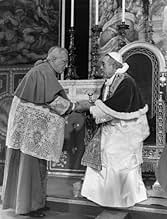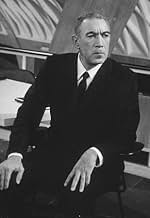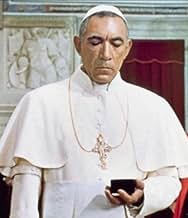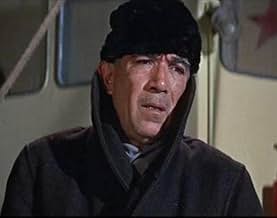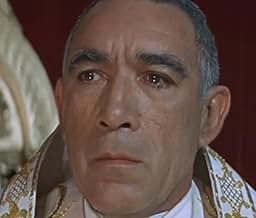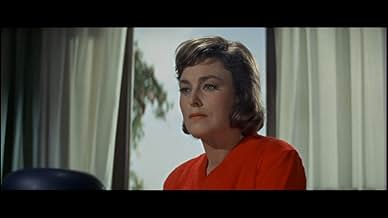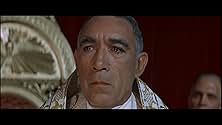After spending decades in a Siberian Gulag labor camp, Roman Catholic priest Kiril Lakota is set free by Russian leader Piotr Ilyich Kamenev at the height of the Cold War.After spending decades in a Siberian Gulag labor camp, Roman Catholic priest Kiril Lakota is set free by Russian leader Piotr Ilyich Kamenev at the height of the Cold War.After spending decades in a Siberian Gulag labor camp, Roman Catholic priest Kiril Lakota is set free by Russian leader Piotr Ilyich Kamenev at the height of the Cold War.
- Director
- Writers
- Stars
- Nominated for 2 Oscars
- 4 wins & 5 nominations total
- Piotr Ilyich Kamenev
- (as Sir Laurence Olivier)
- The Elder Pope
- (as Sir John Gielgud)
- Chiara
- (as Rosemarie Dexter)
- Gelasio
- (as Arnoldo Foa')
- Gorshenin
- (credit only)
- Director
- Writers
- All cast & crew
- Production, box office & more at IMDbPro
Featured reviews
This movie is not without its flaws. The editing is awkward and the film could have been tightened a bit (okay, a lot!). One of the things that bugs me is how the character of Cardinal Rinaldi (the Vatican Secretary of State played by Vittorio De Sica, who is pivotal in the early part of the movie) disappears in the second half without any explanation.
Also, the sub-plot with David Janssen as a philandering television reporter is annoying and superfluous. His only redeeming contribution is in how, during his reports, he provides good exposition about the traditions involved in burying one pope and electing the next.
But these things pale next to Oskar Werner's wonderful, understated perfomance as a philosopher/archeologist/priest who becomes friends with the soon-to-be Pope Kiril. (This character, Fr. David Telemond, is clearly based on Pierre Teilhard de Chardin.) The relationship of suspicion and affection between these two men is very engaging.
Werner has one of the best lines in the film when, after his character is censored by a pontifical commission, he says, "The Church. I hate her, still I cannot leave her. I love her, still I cannot live in her in peace." I think that line is beautiful and sums up the way many Catholics feel!
Finally, I have to say that I am not a big Anthony Quinn fan. I usually found him to be hammy. (I think he got a little too much mileage out of his Zorba schtick!) But in this film, he is wonderfully restrained. He gives a soulful performance as a reluctant hero who has suffered much and now only wants to be left in peace, but who also feels the call of his God and his fellow human beings. In my opinion, even though it is largely ignored by the critics, Quinn gave his best performance in Shoes of the Fisherman.
The film draws the viewer into the movie with scenes we have often witnessed from St. Peter's Square of huge crowds at the time of a pope's death and the subsequent election of his successor. David Jansen is the erudite broadcaster talking to American audiences about the workings of the Vatican and the progress of events. There are the processions through the square, close-ups of statues around the square, puffs of black and white smoke telling onlookers the status of the balloting, and the tolling of bells. The movie goes behind the scenes and takes the viewer back to the square with the throngs waiting in anticipation until the drama is over. In this film, it reaches a finale with the coronation and in particular, the words of the new pope.
I found the pomp and pageantry and the sacred traditions surrounding the death of a pope and the election of a successor to be well described and displayed. The inquisitorial nature of the pontifical commission grilling the Oscar Werner character is what we are given to believe about the Vatican's treatment of theologians. Werner was outstanding in his role as an avant grade theologian breathing new life into church dogma against the rather staid and anti-intellectual Vatican insiders. Vittorio de Sica was excellent as the urbane Secretary of State. Leo McKern, as the conservative Cardinal Leone, was shown to be a man with some foresight and compassion. John Gielgud had a brief but impressive role as the aging pope welcoming Kiril Lakota to the Vatican. A large-scale movie with an excellent cast, I would gladly see the it again.
Soon after his arriving, the pope died. None of the 'favorites' were chosen for his successor. On the seventh vote Kiril was elected to be the new pope. He brought a different perspective to the Vatican than his colleagues were used to seeing. He didn't let his position go to his head, but rather wanted to get out of his confines and feel the pulse of the community. "We're all in prison one way or another." "What do you think of Christ?"
This movie did however make one point to me. Even though the Catholic Church is a system far from perfect, there are people in it who God is leading, who 'walk in the shoes of the Fisherman,' and who live unselfishly to help their fellow men in need. 'How does a man ever know if his actions are for himself or for God?" "You don't know. You have a duty to act, but you have no right to expect approval, or even a successful outcome."
The performance of Anthony Quinn as Kiril I is truly outstanding -- his Ukrainian accent, his almost mystical yet practical manner and his eloquent speeches make this an Oscar-worthy performance (why he wasn't nominated, I'll never know). Oskar Werner as Fr. Telemond was equally touching. Flattered at being chosen to be the pope's friend, secretary and confidant, he comes to realize he has taught the pope many things while learning a few things himself. Thinly based on the life of Fr. Pierre Teilhard de Chardin, Oskar Werner gives a moving performance as the terminally ill, brilliant but troubled priest-philosopher-thinker. This is by no means a perfect movie --- some of the clothes are dated and the music at the party where the reporter meets up with his mistress is annoying. But minor flaws aside, this is a wonderful movie that gives tremendous insight into the workings of the Vatican, the papacy and even the human heart.
Did you know
- TriviaIn the scene where Pope Kiril I (Anthony Quinn) prays over the body of the Jewish man, he recites the Shema. However, rather than say "Adonai," he says, "Hashem." This is because "Adonai" is traditionally only said when one is actually at prayer, and not simply reciting a prayer in a secular context, as in during a performance (specifically, in a movie).
- GoofsIn an on-air report, George Farber states, "after the sixth ballot, still only black smoke from the window of the Sistine Chapel." As a preceding shot demonstrated, the smoke rises from a stove pipe on the roof of the Sistine Chapel, not from a window.
- Quotes
George Faber: Were you permitted to practice your ministry as a priest?
Kiril Lakota: No, I - I practiced it without permission among my fellow prisoners.
George Faber: Do you see any hope then for the day when Christian faith, or more specifically the Roman Catholic faith, may be practiced freely in Marxist countries?
Kiril Lakota: I have no inside information as to how the Kingdom of God is going to be established.
- ConnectionsFeatured in The Shoes of the Fisherman (1968)
- How long is The Shoes of the Fisherman?Powered by Alexa
Details
- Release date
- Country of origin
- Languages
- Also known as
- Las sandalias del pescador
- Filming locations
- PalaLottomatico, Rome, Lazio, Italy(meeting with Chinese leader)
- Production company
- See more company credits at IMDbPro
- Runtime2 hours 42 minutes
- Sound mix
- Aspect ratio
- 2.35 : 1
Contribute to this page



